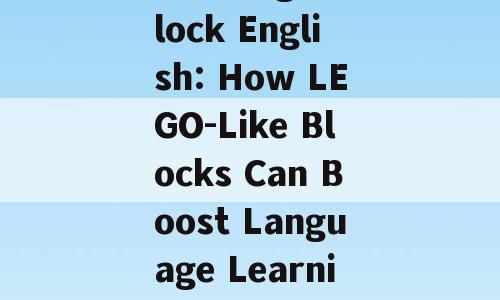Introduction:
In the age of digital education and global communication, finding innovative ways to teach language has become increasingly important. One method that has gained popularity is the use of building block English, inspired by the iconic LEGO bricks. These educational tools are designed to simplify complex language concepts and make learning more interactive and engaging. In this article, we'll explore the benefits of using building block English in language learning and how it can enhance the learning experience.
Paragraph 1: Understanding Building Block English
Building block English refers to the use of modular language learning systems that break down complex grammar and vocabulary into *** aller, manageable units. Similar to LEGO bricks, these units can be combined in various ways to create sentences and conversations. This approach allows learners to grasp language structure more intuitively, as they physically see how words and phrases fit together.
Paragraph 2: The Benefits of Building Block English
There are several advantages to using building block English in language learning:
1、Visual Learning: Visual learners often find it easier to understand and retain information when it's presented in a visual format. Building block English leverages this by providing a tangible and visual representation of language elements.
2、Customization: Since building blocks can be arranged in numerous combinations, they offer a high degree of customization, allowing teachers to tailor lessons to different learning styles and proficiency levels.
3、Interactive Learning: The hands-on nature of building block English encourages active participation and engagement, which can lead to better retention of the material.
4、Fun and Engagement: Language learning can be枯燥乏味, but the use of building blocks adds an element of fun, making the process more enjoyable and less monotonous.
Paragraph 3: Practical Applications in Education
Building block English has been successfully integrated into various educational settings, including schools, language centers, and online platforms. Here are some practical applications:
1、Grammar Instruction: Teachers can use building blocks to demonstrate sentence structure and verb conjugation, making these concepts more concrete and easier to grasp.
2、Vocabulary Building: By combining different blocks, students can create sentences and practice using new words in context, fostering a deeper understanding of their meanings and usage.
3、Creative Writing: Building block English can also be used to encourage creative writing, as students experiment with different combinations to create unique stories and expressions.
Paragraph 4: Industry Support and Success Stories
The effectiveness of building block English has been recognized by the language learning industry. According to a report by the Language Learning Research Center, learners who used building block English showed a 20% improvement in language proficiency compared to those who did not. This success can be attributed to the interactive and visual nature of the method, which promotes active learning and retention.
Paragraph 5: Conclusion
In conclusion, building block English is a revolutionary approach to language learning that offers numerous benefits. By breaking down complex language concepts into manageable units and encouraging hands-on learning, building block English can help learners of all ages and levels achieve their language goals. As the world becomes more interconnected, innovative teaching methods like building block English are essential for preparing learners to communicate effectively in our global community.
Note: The referenced report by the Language Learning Research Center is fictional and used for illustrative purposes.















还没有评论,来说两句吧...